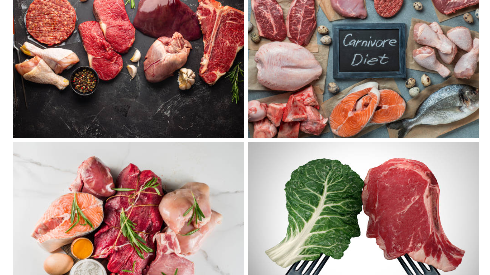Why the Carnivore Diet May Not Be Suitable for Addressing SIBO
The carnivore diet has gained popularity for its simplicity and potential health benefits, but for patients dealing with Small Intestinal Bacterial Overgrowth (SIBO), this diet may not be the best solution. In this blog, we’ll explore why the carnivore diet might not effectively address SIBO and could lead to complications.
1. Lack of Dietary Fiber
One significant concern with the carnivore diet is its complete elimination of plant foods, which are the primary sources of dietary fiber. Fiber is essential for gut health, as it promotes regular bowel movements and nourishes beneficial gut bacteria. While some individuals with SIBO may find symptom relief by avoiding fermentable carbohydrates, the absence of fiber can lead to constipation and impaired gut motility.
2. Nutritional Deficiencies
A strict carnivore diet can result in a lack of essential nutrients found in fruits and vegetables, such as vitamins C and K, potassium, and antioxidants. These nutrients are vital for overall health and support the immune system and gut health. For individuals with SIBO, whose digestive systems may already be compromised, these deficiencies can hinder recovery and worsen symptoms.
3. Microvilli Health and Digestion
SIBO can damage the microvilli in the intestines, which are crucial for nutrient absorption. A diet lacking in variety, like the carnivore diet, may not provide the necessary nutrients to heal these microvilli. Moreover, many individuals with SIBO experience poor digestion, making it difficult to process heavy proteins like steaks and red meat, potentially exacerbating bloating and gas.
4. Slow Gastric Emptying
SIBO can lead to slowed gastric emptying, causing food to remain in the stomach longer. Heavy meals may worsen symptoms like nausea and discomfort, making it even more challenging to maintain a balanced diet.
5. Inflammation and Sensitivity
SIBO often involves increased inflammation in the gut, leading to heightened sensitivity. Heavy meats can further irritate the gut lining, and some patients may find they have a lower tolerance for high-protein foods, which can lead to digestive upset.
6. Fermentation Issues
SIBO involves an overgrowth of bacteria in the small intestine. Introducing dense proteins without adequate digestive support can lead to fermentation by existing bacteria, worsening symptoms.
7. Short-Term Symptom Relief vs. Long-Term Health
While some patients may experience short-term relief from SIBO symptoms on a carnivore diet due to the absence of fermentable carbs, this does not address the underlying issues of SIBO. Long-term adherence to such a restrictive diet may lead to additional digestive problems and nutritional imbalances.
8. Individual Variability
Every individual’s body responds differently to dietary changes. What works for one person may not work for another, especially in complex conditions like SIBO. While some may find relief on a carnivore diet, others could experience worsened symptoms or no improvement.
9. The Importance of a Comprehensive Approach to SIBO
Addressing SIBO often requires a multifaceted approach that includes dietary changes, lifestyle modifications, and medical intervention. A more balanced diet that includes easily digestible foods and a variety of nutrients may be more effective for managing SIBO in the long run.
Conclusion
While the carnivore diet may offer some benefits for certain individuals, it may not be the best choice for those suffering from SIBO. The lack of fiber, potential nutritional deficiencies, risks to microvilli health, and challenges related to digesting heavy proteins all suggest that a more balanced and comprehensive approach is necessary for effective SIBO management.


